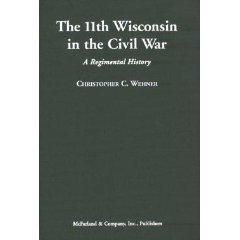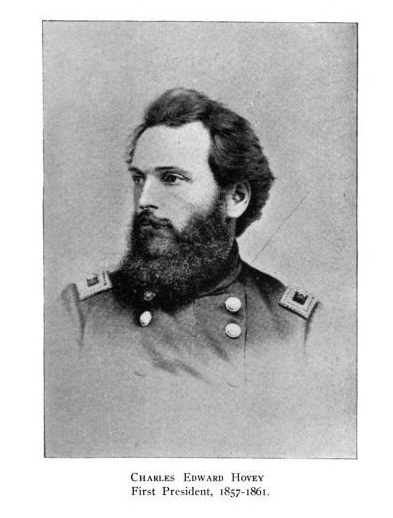Battle of Ft. Blakely
author: Capt. H. R. Hubbard
published by: Mendon Dispatch, circa 1904
synopses: Personal accounts of the Civil War by Capt. Hubbard
personal subject: The Battle for Ft. Blakely
The campaign against Mobile in the early part of 1865, culminating April 9th in the capture of Ft. Blakely was my first service after graduating from southern prisons in December, 1864. I was at that time captain of Co. A. 119th Ill., first brigade, second division or the 16th corps. Col. T.J. Kinney commanded the division and Gen. A.J. Smith the corps. We rendezvoued at Dauphin Island, in Mobile Bay in March. After Farragut silenced Ft. Morgan and put the rebel fleet out of commission, we went by boat to Fish River on the east side of Mobile Bay, marched past the rear of Ft. Spanish and took up position in rear of Ft. Blakely. My company was on the skirmish line opposite the center of the rebel works, which were about a mile long. We were nearly out of ammunition before noon, so I started back for more. At the edge of the standing timber I met Col. Kinney, who sent back to camp for 1000 rounds of cartridges. I opened the box and emptied the cartridges into my pouches, slung them over my shoulder and started back. The rebel sharpshooters were very attentive and cut the brush away all around me with bullets and tore up the ground some; but their range was long and their fire was not very accurate. The company cooks came to the edge of the timber with our dinners. They had each several haversacks and two big camp kettles to carry, and naturally hesitated a little about exposing the camp kettle to the enemy’s fire, for fear of damage to the kettles and consequently loss of coffee and beans.
But Col. Kinney assured them there was no danger; that I had just gone safely back and was a much larger mark than they were. So “Darkie Ned” started out, and “Bob Knight” said “No domd naggur can go where I darsen’t go,” and Ira Boat said, “The Dutch are just as bold as the Irish and niggers,” so we got a warm dinner and enjoyed the picnic, though Boat had the bottom shot off one of his camp kettles going back.
The next day our brigade was moved to the extreme left of our line to take up a new position and more closely invest the fort.
Late in the afternoon of the 7th of April, my company and Co. C., Capt. Curry, Capt. Chupp’s company of the 89th Ind., and I believe another company of the 89th, two of the 122d Ill., and two from the 21st Mo. all under command of Major Winter, of the 89th Ind., were sent by Gen. Gerrard to take up a new position on the extreme left of our line. We drove back the rebel pickets and occupied their grounds. Finding the cross fire from our own lines on the right very annoying I suggested to Major Winter that we notify our neighbors on the right of our position and invite them to come up alongside, where they could shoot at the rebels. He agreed, and sent me to negotiate with them. I found a squad of the 11th Wis. under Lieut. Angus McDougall, and they agreed to move up and co-ooperate with us.
When I got back my command was gone. I soon found my orderly sergeant,k who with seventeen of my command, were waiting for my return. They informed me that in my absence the whole detachment were moved up until they drew the fire of the fort and had then fallen back. By this time it was very dark. I took my little squad right back to the ground we had occupied when I first left them. The Johnnies were just coming back to their former position but they retired again without much argument, and I started back for reinforcements.
I found Major Winters and the rest of the command half a mile back, faced towards the southwest, at right angles to their first position, with the remainder of my company in arrest, because they refused to retreat further and insisted on going back to look for the rest of the company. I had a short argument with the major which ended in compromise, and we all marched back, established a reserve post, advanced and extended our skirmish line laid out a line of rifle pits and by daylight were ready for business at the new stand.
We were attacked by the rebels just as our relief came up, but stood them off, with a loss of only one man wounded.
That day the rest of the regiment were busy building bombproofs and camp fortifications. We declined to participate because we had been on duty all night. Lieut. Taylor said, “Co. A is hell to fight, but not worth a dam to work.”
On the night of the 8th of April my company went into the rifle pits again, advanced, took the rebel rifle pits and turned them around. While working we held our fire, but when we had finished our new pits we wanted to try them, so fired three shots from the left end and then a volley at the blaze of the guns fired in return. The rebels in their rifle pits and a working party planting torpedoes in front of the rebel breastworks retreated into the fort. Then the rebels in the fort opened fire with cannon and musketry. Our batterires (sic) replied, and for half an hour or more the firing was very heavy. At the height of the engagement Capt. McConnell, with Co. H of the 119th Ill., rushed up from the reserve shouting, “Hold ’em, boys, we’re coming.” When he understood the situation he gave us his benediction and ordered his men back to the reserve again.
About 50,000 men turned out under arms that night. Next day different brigade commanders reported heavy fighting in the night. One had repulsed three heavy, successive charges with great loss to the enemy. All had held their ground. The Mobile papers reported a general charge all along the line, repulsed with a loss to the Yankees of 10,000 men. From information obtained later I am inclined to think this night alarm helped to demoralize the garrison of Ft. Blakeley and made them easier to capture on the next evening, when the final charge ended the last battle of the war.[1]
1- http://www.janneyfamily.com/harmon_hubbard/hr_civil_war_11_04

 Hello 11th Wisconsin descendants and enquirers! I do not have any updates on how sales are going, but for a regiment history, it seems to be strong. Reviews are starting to come in, and so far so good.
Hello 11th Wisconsin descendants and enquirers! I do not have any updates on how sales are going, but for a regiment history, it seems to be strong. Reviews are starting to come in, and so far so good. 
